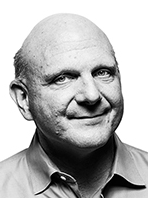Ballmer on course to be Microsoft's No. 1 shareholder in 2014

I'm still digging out from a backlog of holiday reading, but wanted to take a quick moment to point out a couple of articles worth a read by those keeping tabs on Microsoft.

Computerworld's Gregg Keizer did the math and came up with an interesting predictive post on January 5. Keizer noted that while Microsoft Chairman Bill Gates is still the No. 1 independent Microsoft shareholder, he may not be for much longer. At the start of the new year, Gates had about a 25 million share lead on the No. 2 shareholder, outgoing CEO Steve Ballmer. Gates is said to own roughly 4.5 percent of Microsoft's shares, compared to Ballmer's 4 percent.
As Keizer noted, if Gates continues to sell off Microsoft shares at his current pace -- about 20 million shares per quarter -- Ballmer will usurp the spot as the top independent Microsoft shareholder by mid-2014.
Ballmer has made it clear -- in his last official letter to shareholders, in fact -- that he is "an investor who treasures his Microsoft stock."
This is interesting given the reported external agitation to have Gates and Ballmer removed from the Microsoft board of directors. There's no indication this is going to happen. Both of them got the nod to keep their board seats for another year as of the 2013 Microsoft shareholder meeting.
I myself haven't heard from any of my contacts that Gates' and Ballmer's presence on the board is having any kind of a drag on Microsoft appointing its new CEO, in spite of a report to the contrary. I have to say, if a potential Microsoft CEO candidate isn't onboard with Gates and Ballmer being active board members and/or with last year's "One Microsoft" reorg, I don't understand why that person would be interested in the Microsoft CEO job in the first place.
Another piece of potential interest to Microsoft watchers is a December 27 profile of Mark Penn that ran in New York Magazine.
There aren't a whole lot of new revelations in Reid Cherlin's "72 Minutes With Mark Penn" (provocatively subtitled "Breaking down campaign strategy with the former Clinton Svengali turned Microsoft attack dog"). I was interested to read about Penn's Washington DC office, where he and his self-appointed SWAT team seemingly spend quite a bit of time.
The story was interesting to me mostly because Penn doesn't speak to the press a whole lot. He speaks indirectly, of course, through the Microsoft "Scroogled" anti-Google campaign and the new round of iPad-targeted Windows 8 ads. And he mysteriously appears at certain events, like Microsoft's Surface 2 launch in New York last fall (Windows SuperSite's Paul Thurrott and I spotted him in the audience, but he disappeared before either of us went over.)
Even though as of last July, Penn is now Executive Vice President of Advertising and Strategy and a member of Microsoft's Senior Leadership Team, Penn either doesn't want to or isn't encouraged to chat up us press and analyst types.
Penn's negative messaging, as exemplified by the ongoing "Scroogled" campaign isn't for everyone. When I interviewed Ballmer about his legacy late last year, he acknowledged that "the voice we're using in our Scroogled campaign makes some people ... tense, inside the company and outside the company."
"I actually think it's a perfectly reasonable voice for the company to have. It's not the only voice we should have, but we need different," Ballmer added. Sometimes, "you've got to be humorous. We were never humorous about that Linux compete stuff, right? It was never humorous."
Ballmer said Microsoft needs to have different voices for markets where it's a leader vs. where it's a challenger, and that the company has been finding its voice."